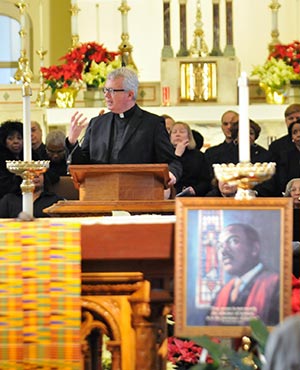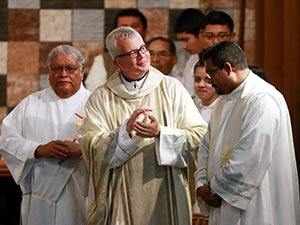As director of intercultural ministries, Eva Diaz’s role is to be an advocate for the various multicultural Catholic communities in the Archdiocese of Milwaukee. Her office is constantly busy as she and staff members serve the needs of Hispanic, African-American, Native American, Asian/Pacific Islander and deaf and hard of hearing Catholics. Bishop Donald J. Hying speaks Saturday, Jan. 19, 2013, at St. Francis of Assisi Church, Milwaukee, as part of the archdiocesan Rev. Dr. Martin Luther King Jr. celebration. (Catholic Herald photo by Juan C. Medina)
Bishop Donald J. Hying speaks Saturday, Jan. 19, 2013, at St. Francis of Assisi Church, Milwaukee, as part of the archdiocesan Rev. Dr. Martin Luther King Jr. celebration. (Catholic Herald photo by Juan C. Medina)
For the last few years one of her constant go-to advocates was Bishop Donald J. Hying.
“He has a special place in his heart for especially the smaller groups that might need assistance,” Diaz said. “It’s an expression of the church’s care and concern.”
Diaz said Bishop Hying has a public ministry. He would go to small group meetings of each of the different ethnic groups to listen to what they had to say.
“He’s a bishop, but he’s first a priest, a pastor,” Diaz said. “It makes you feel cared for. It makes you feel that you’re important.”
Personal touch makes difference
His attendance at meetings and events helped create an intimate dialogue, she said.
MASS INFORMATIONBefore leaving for Gary, |
“The personal touch does make a difference,” Diaz said. “All these cultures look to the bishops with affection and want to be in a relationship with him.”
As a priest, Bishop Hying spent three years in the Dominican Republic with La Sagrada Familia Parish, the archdiocesan sister parish in Sabana Yegua. While there, he became fluent in Spanish, a skill he continues to use during Masses and at gatherings with Hispanic Catholics.
“Learning a language is not easy,” Diaz said. “If it were easier, he would probably speak a lot more (languages).”
 Deacon Roberto Fuentes, left, and Bishop Donald J. Hying praise Cristo Rey pastor Fr. Anthony Primal Thomas during the final Mass at Cristo Rey Parish, Racine, celebrated by Bishop Hying in Spanish. The following weekend, Cristo Rey merged with St. Patrick Parish, Racine. (Catholic Herald photo by Allen Fredrickson)In 2012 and 2014, Bishop Hying celebrated the Mass in Spanish at Mexican Fiesta on the Henry W. Maier Summerfest Grounds on Milwaukee’s lakefront.
Deacon Roberto Fuentes, left, and Bishop Donald J. Hying praise Cristo Rey pastor Fr. Anthony Primal Thomas during the final Mass at Cristo Rey Parish, Racine, celebrated by Bishop Hying in Spanish. The following weekend, Cristo Rey merged with St. Patrick Parish, Racine. (Catholic Herald photo by Allen Fredrickson)In 2012 and 2014, Bishop Hying celebrated the Mass in Spanish at Mexican Fiesta on the Henry W. Maier Summerfest Grounds on Milwaukee’s lakefront.
Diaz credits his listening ability with helping minority groups feel comfortable with him.
“He would always make that point, that he’s accessible,” she said. “He’s very open to trying to understand the perspective that the group brings to whatever the process is at hand and I think that he respects that part of the person’s and group’s identity.”
Bishop Hying was unafraid to go to anyone and ask, “What are your needs?” Diaz said, adding he touched many people because of that.
“He was a bridge person. He was very much a bridge builder,” she said. “The main concern is that he’s leaving so quickly that the groups would not be able to say goodbye.”
Long-lasting impact
on black Catholics
Valeria Spinner-Banks, treasurer of the Black Catholic Ministry Commission, was shocked and saddened when she heard the news Bishop Hying was assigned to the Diocese of Gary, Indiana.
In the past, the relationship between the archdiocese and the black Catholic community has had its difficulties, but Bishop Hying made it a point to address those hardships.
“He gave so much and he just really kind of made us start believing in that we amount to something. We mean something,” Spinner-Banks said of his impact on the black Catholic community. “That hasn’t been shown to us in a very, very long time.”
Spinner-Banks said she remembers Bishop Hying attending Umoja, a black Catholic marriage retreat, and how much that meant to the community.
“He gave such a wonderful talk about how marriage is like the church,” Spinner-Banks said. “It was so beautiful that a lot of the couples didn’t want him to stop.”
Spinner-Banks admitted she was “a little skeptical” when she first encountered Bishop Hying.
“But then as we got to know him and sense his whole sense of compassion and his way of listening … that’s what impacted our community,” she said. “We began to build trust … he did this. Bishop Hying brought it back. We knew that he was someone we could count on,” she said.
Helps heal wounds
Last month Bishop Hying met with the Black Catholic Ministry Commission to strategize on how to strengthen the community.
“He was helping us heal from the wounds of the churches being closed in the central city area,” Spinner-Banks said. “He said, right out, that he really cared about our community and he wanted to do anything that he could do to help our community.”
Bishop Hying helped by listening to their problems.
“He listened to the pain and the anger people had about the churches being closed 20 years ago because a lot of people have not worked through that,” Spinner-Banks said. “He listened to that and that was very important because I think a lot of people felt finally someone is listening to what we have to say and how we feel.”
Spinner-Banks said he was always “in our corner” but they have to continue the work he helped start.
“He encouraged us to, no matter what was going to happen with the archdiocese and how they were going to relate to us, that we needed to continue as a community, to build our community and become strong,” Spinner-Banks said. “That is one of the things I think he leaves with us.”
Spinner-Banks said Bishop Hying was always someone they could always count on.
“If you asked him to do something and it was in his power to do it, he would do it,” she said. “He came to us. We didn’t come to him; he came to us and that told us right off the bat that he was really interested in what was happening with us.”
Spinner-Banks said the community is going to miss Bishop Hying deeply.
“I keep saying, ‘How did Pope Francis know about this one lowly little bishop over here in Milwaukee, Wisconsin?’” she said. “We still need to continue on and not let his legacy, that he wants for us, to die.”
Inspiration to Asian community
In summer 2012, a refugee family from Myanmar came to St. Michael Parish, Milwaukee, a central location for the Hmong Catholic community. Lacking the proper information about who could help them the best, members from the parish reached out to Bishop Hying.
“His main role was to bring representatives from the Catholic Charities and the staff from the parish here, to sit down together,” Chasong Yang, pastoral associate, said. “By meeting with him, you can feel he sincerely wants to help and his generous understanding of the situation, and he shows compassion to the family and (he’s) willing to do whatever he can to help; that inspired me.”
Over the years, various changes in Catholic Charities had caused miscommunication between the Hmong community and the agency. Yang said Bishop Hying helped facilitate lines of communication.
He said Bishop Hying celebrated Mass at St. Michael and at Asian Unity Day.
“Before he became auxiliary bishop, I didn’t know anything about him,” he said. “When he came to St. Michael and I had a chance to meet with him, I felt like the pope appointed the right person.”
Yang said the Hmong community has felt isolated from the archdiocese, but Bishop Hying was a voice they could talk to about their issues.
“We will miss his presence in the diocese,” Yang said. “We’re happy and proud for him to be a shepherd in that diocese but we will miss him.”
During his time with the Hmong community, Yang said he’s been impressed with how Bishop Hying can interact so well with different people from different cultures.
“Personally, I admire his generous interest to go around to all the communities,” Yang said.
